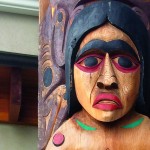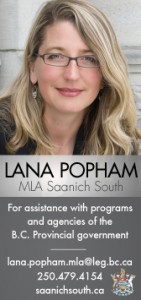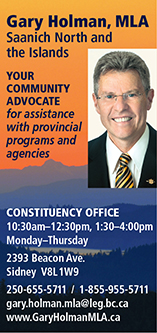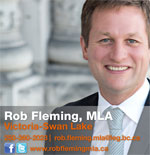Posts Tagged ‘TRC’

Hearing the Calls for Action from the TRC
North & Central Saanich move forward with the Reconciliation process.
by Michele Murphy
Last June the Truth and Reconciliation Commission of Canada (TRC) released its long-awaited report, Honouring the Truth, Reconciling the Future. In this historical report are 94 recommended Calls to Action urging all levels of government — federal, provincial, territorial, Aboriginal, and municipal — to work together to change policies and programs in an effort to repair the harm caused by residential schools and move forward with reconciliation.
This past January (2016) both Central and North Saanich officially began the process of reconciliation and working through the TRC report and the recommendations that it offers.
The TRC was formed, and the report was produced, as part of the federal Indian Residential Schools Settlement Agreement of 2008, the class-action settlement in which former residential school students took the federal government and the churches to court. It was the largest class-action settlement in Canadian history.
The TRC’s Report is the culmination of six years of research documenting more than 150 years of Residential school experiences of the Aboriginal peoples, mainly children. It serves as a public historical record of the past policies and operations of the former residential schools. The report includes a detailed account of the psychological, physical, and sexual abuse inflicted upon Indigenous children in government residential schools, abuse that resulted in more than 3,200 deaths and devastating long-term, multi-generational effects and consequences.
Of the 94 recommendations for the report offers, at least 16 are actionable at the local level, and five specifically call upon municipalities to take action – all with the goal of building new equal partnerships with Aboriginal people in Canada based on truth, dignity, and mutual respect.
The five recommendations that specifically call upon municipalities are:
#43: We call upon federal, provincial, territorial, and municipal governments to fully adopt and implement the United Nations Declaration on the Rights of Indigenous Peoples as the framework for reconciliation.#47: We call upon federal, provincial, territorial, and municipal governments to repudiate concepts used to justify European sovereignty over Indigenous peoples and lands, such as the Doctrine of Discovery and terra nullius, and to reform those laws, government policies, and litigation strategies that continue to rely on such concepts.
#57: We call upon federal, provincial, territorial, and municipal governments to provide education to public servants on the history of Aboriginal peoples, including the history and legacy of residential schools, the United Nations Declaration on the Rights of Indigenous Peoples, Treaties and Aboriginal rights, Indigenous law, and Aboriginal–Crown relations. This will require skills- based training in intercultural competency, conflict resolution, human rights, and anti-racism.
#75: We call upon the federal government to work with provincial, territorial, and municipal governments, churches, Aboriginal communities, former residential school students, and current landowners to develop and implement strategies and procedures for the ongoing identification, documentation, maintenance, commemoration, and protection of residential school cemeteries or other sites at which residential school children were buried. This is to include the provision of appropriate memorial ceremonies and commemorative markers to honour the deceased children.
Advertiser
#77: We call upon provincial, territorial, municipal, and community archives to work collaboratively with the National Centre for Truth and Reconciliation to identify and collect copies of all records relevant to the history and legacy of the residential school system, and to provide these to the National Centre for Truth and Reconciliation.
The Union of BC Municipalities (UBCM) initiated dialogue on the TRC Call to Action last September at their annual convention inviting the Commissioner of the TRC, Dr. Marie Wilson to address the assembly. Wilson’s presentation focused on the 16 Calls to Action related to municipal and/or all order of government. She challenged local governments to do their part in advancing the process of reconciliation.
By December the Federation of Canadian Municipalities (FCM) issued a statement saying that, “the FCM is committed to supporting municipalities in their efforts to forge these renewed relationships based on mutual understanding and respect.” The mayors of Canada’s big cities reaffirmed their commitment to work together with Aboriginal leaders to deliver real change in the same statement.
At the regional level Capital Regional District (CRD) Board director Marianne Alto made a recommendation that the CRD Board ask the staff to report back as soon as March with recommendations as to how to move forward. As of SVO’s press time that recommendation is still in process. In viewing the online video of the CRD’s January Board meeting it would seem that there are varying levels of awareness of the TRC report’s recommendations by the directors (item 8.3).
Municipalities across the country are beginning to take up the challenge of reconciliation, some in creative and interesting ways. This past January both Central and North Saanich begun the process of looking at what they can do as municipalities to reconcile the past and move forward in a respectful way.
At Central Saanich’s January council meeting Coun. Zeb King put forward a motion asking that council direct the municipality’s CAO to, over the course of the coming year, come up with options as to how they move forward on the TRC’s five municipally focused recommendations. When asked of the outcome King replied, “I’m so pleased to report that my motion for action on the recommendations of the Truth and Reconciliation Commission was unanimously approved by Central Saanich Council this evening. This is one step forward with more to come.” King raised his hands and said “HISWKE”, (thank you in Sencoten), upon completion of the vote.
North Saanich included the TRC’s report and its Calls to Action in its January 14 day-long strategic planning session. “One of the new items we added was the TRC and how we as local government might respond, and specifically noted Actions 43, 57 and 77,“ explains North Saanich Coun. Heather Gartshore, adding, “Our Council is in support of moving the conversation forward, recognizing that we have a role in reconciliation with our First Nations communities.”
As yet the recommendations of the TRC have not come before Saanich or Sidney Council.
Saanich and the Peninsula is home to four thriving First Nations communities: Tsartlip, Tsawout, Pauquachin, and Tseycum First Nation. The opportunity for creating meaningful change in the relationships between First Nations and non-Aboriginal people is rich in this area.
This is the first of a series of articles that will look at the reconciliation process in our communities. If you would like to contribute to the series, please do be in touch at [email protected].
The full TRC Report summary report can be found at www.TRC.ca












